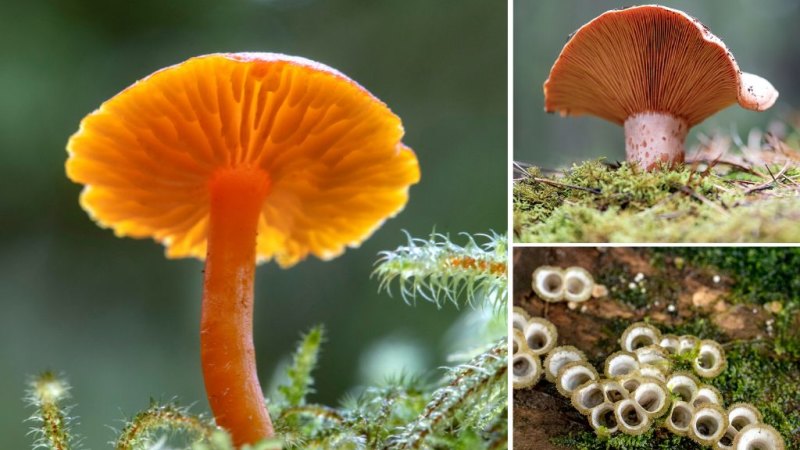If we ever get out of this environmental mess, it won’t be thanks to ego-driven men with projects and messiah complexes visible from space. It will be the quiet oddballs on their hands and knees rooting around in the underbrush that help us slow down and see the ancient wisdom around our feet. People such as Alison Pouliot, author of Underground Lovers: Encounters with Fungi, her third book on mushrooms.
This is one of a slew of recent books looking to set the record straight on mushrooms. Fungi have copped a bad rep, studied as pathogens to crops, they have historically been considered agents limiting yield and impeding economic development. It’s a blinkered narrative that discounts their contribution to the biosphere – breaking down dead trees, enriching and aerating soils via deep subterranean networks called mycelia, they are in relationships (not always benign) with animals and insects, who eat and live inside them.
Clockwise, from main: Hygrocybe miniata, pine mushroom and mushrooms in Chile’s Villarrica National Park.Credit:Alison Pouliot, New York Times
There is also still much we do not know – new species are regularly discovered while known breeds can cross oceans, popping up in places they were never thought to colonise.
A book that casts a maligned organism as misunderstood hero, lives or dies based on the personality of its lead. Thankfully, Pouliot conveys the otherworldly charisma of mushrooms with love and skill. This is more than mere dramatic technique: fungi’s reputation carries real consequences.
Pouliot recounts a vexed arborist at a local council, asked to protect heritage trees. He is ordered by his superior to remove mushrooms that sprout after rain. The trees are strengthened by the fungi’s contribution to their ecosystem, yet the boss considers them unhealthy invaders, a danger to public safety, and so the arborist does what he is ordered despite his greater understanding.
Underground Lovers: Encounters with Fungi by Alison Pouliot.
Pouliot sagely explains the system, not the boss, is the true villain; local governments are risk-averse bureaucracies. Here is the recurring story of humans and the environment: our systems dominate our better knowledge.
When not considered with suspicion, mushrooms are simply unseen. In another account, Pouliot is in Switzerland’s Erlenwald, a patch “just large enough to allow you to … imagine you are in a deep forest” when men in hi-viz come roaring through with leaf blowers, sucking up leaves and unwittingly tearing apart wild fungi. Leaving aside the low-hanging jabs at Swiss fastidiousness, we see fungi now lumped together with the detritus produced by a more aesthetically pleasing version of nature, itself subjugated and confined.
At times Pouliot leans a little too heavily on the persecution of ’shrooms and does not acknowledge the mushroom’s soaring profile that she herself has helped to build. After all, we’ve been eating them forever; each autumn you’ll find hipsters shoulder-to-shoulder with the organically inclined, foraging in the dewy hills around major cities. Claims taller than mere sustenance have been extended by recent studies in psychedelics and the promise that psilocybin will revolutionise everything from depression therapy to spiritual awakenings. Any way you slice them – mushrooms are cool.
Sometimes, perhaps, too cool for their own good. The author discusses the ill-fitting relationship between conservation and aesthetics. Flagship species, those with all the looks and charisma, are needed to represent the broader plight, but as with any major celebrity, they can be trampled underfoot in the stampede for the perfect selfie.
When the author is confronted by a flustered ranger in Iceland who thinks she has illegally camped, she discovers he has witnessed his homeland diminished beneath tourist boots. Iceland has recently become an en vogue tourist destination, but with such a short growing season, the vibrant mosses and lichens that cling to rocks will take decades to recover, if ever.
The geographic scope of Underground Lovers is impressive. Aside from the steaming volcanoes of Iceland and the simmering bush, we visit the towering European Alps and the fecund woods of Oregon. The book also hosts an ensemble of other mycologists and ground-dwellers that range from an American mushroom dealer who can detect a maggot infestation with a subtle squeeze of the mushroom’s cap to slugs asleep like puppies in the interior of a “common puffball”.
Underground Lovers is about hidden worlds on the brink of vanishing, but its lessons extend beyond fungi. Slowness and humility are embedded as virtues, running against the grain of a culture obsessed with speed and personal branding. And so, like mushrooms, its profundity lives hidden in plain sight, available to anyone who cares to crouch and take a closer look.
Underground Lovers: Encounters with Fungi by Alison Pouliot is published by NewSouth, $29.99.
The Booklist is a weekly newsletter for book lovers from books editor Jason Steger. Get it delivered every Friday.
Most Viewed in Culture
From our partners
Source: Read Full Article


